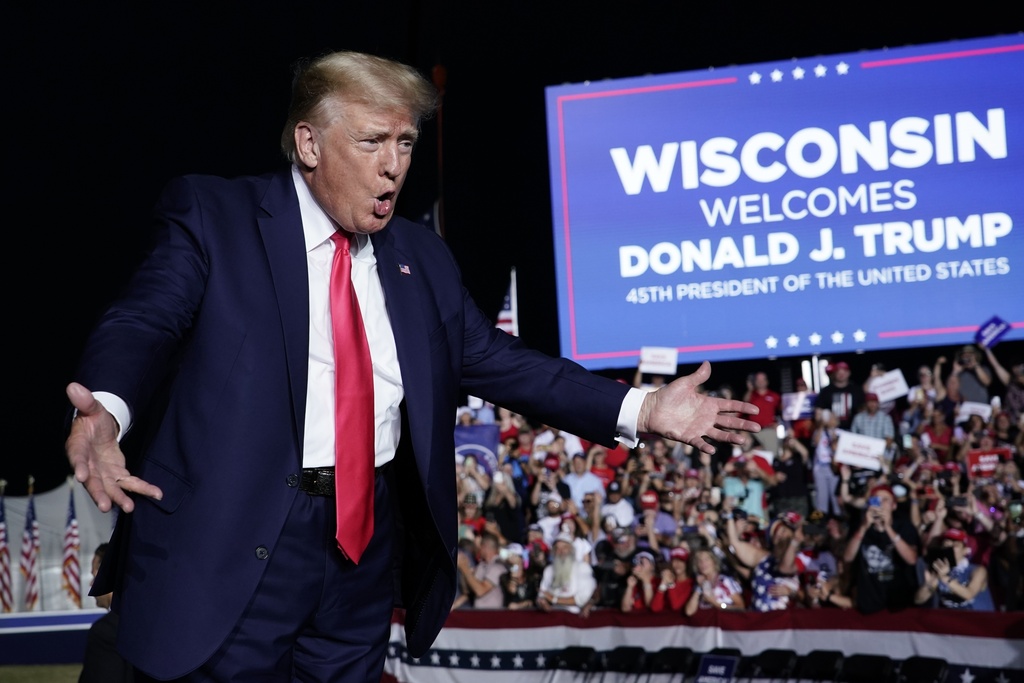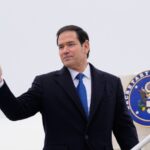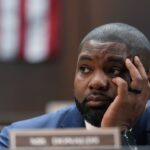
Wisconsin voters will decide Tuesday on a pair of referendums that could change how elections are conducted for decades to come in one of the country’s most politically competitive states.
One would bar state and local governments from using private funds to conduct elections, while the other one mandates that only election officials can carry out election-related tasks.

Broadly speaking, Republicans and conservative groups are urging voters to say “yes” to both, while Democrats are a hard “no.”
Democrats in the battleground state have spent the past decade being boxed out of power by the GOP, which held an iron grip on the state government. Republicans have held control of both houses of the state legislature for years, in part because of the district lines they drew in 2011.
The tide started turning following the fall of Roe v. Wade, which made abortion illegal overnight. That jump-started a fierce battle for a vacancy on the state Supreme Court, which turned into the most expensive state Supreme Court race in history, with an estimated $45 million pumped into it from special interest groups, including liberal megadonor George Soros and Richard and Elizabeth Uihlein, one of America’s wealthiest families who have two of the deepest pockets in conservative politics.
The pair of proposals on Tuesday’s primary ballot are rooted in the scrutiny over millions of dollars in private grants, which Republicans refer to as “Zuckerbucks,” that went to the state’s five largest cities to help them run elections during the pandemic. The money came from the Center for Tech and Civic Life, which is funded by Facebook founder Mark Zuckerberg and his wife, Priscilla Chan.
Election clerks who got the money said it helped them meet the unexpected costs related to running an election during a pandemic and that the money did not jeopardize their ability to run an election fairly.
The questions on the April 2 ballot are two of five that will go before voters this year, the most in one year since 1982.
Here is a breakdown of the pros and cons of the questions that will be decided on Tuesday.
Ballot Question 1
One question is: “Use of private funds in election administration. Shall section 7 (1) of article III of the constitution be created to provide that private donations and grants may not be applied for, accepted, expended, or used in connection with the conduct of any primary, election, or referendum?”
A “yes” vote would mean election administrators could not apply for, receive, or use private donations or grants for elections, while a “no” vote would mean funds would continue to be legal.
Supporters argued that allowing outside money can “create undue influence on elections and the work of election officials,” as well as foster distrust in elections, Emily Lau, an attorney with the University of Wisconsin-Madison’s State Democracy Research Initiative, told Wisconsin Public Radio.
Those supporting the measure include Rep. Jim Jordan (R-OH), who urged a “yes” vote via video, and former President Donald Trump, who took to social media to urge Wisconsinites to vote to “ban Zuckerbucks.” Some Trump supporters argued that the funds were used to hijack the election by promoting turnout in larger cities that had more Democratic voters.
Despite a recount, Republican-led audits, and court cases showing he lost, Trump has continued to push the false narrative that he won the state four years ago. Trump will make a campaign stop in Green Bay on Tuesday.
MacIver Impact, the 501(c)4 arm of the John K. MacIver Institute for Public Policy, launched a digital advertising campaign on Instagram and Facebook in support of both ballot measures, urging voters to “keep Obama & Soros out of Wisconsin elections” and “ban Zuckerbucks.”
CEO Annette Olson said that “commonsense amendments would ban dark money from playing a role in administering elections, and MacIver Impact is proud to lead statewide efforts to encourage citizens to vote ‘yes.’”
Those opposed to the measure argue election work is already underfunded and that stripping money without the guarantee of sufficient public funding could “impede the work of election officials” and just as easily sow distrust.
The Democratic Party of Wisconsin has endorsed a “no” vote. Party Chairman Ben Wikler has accused Republicans of pushing the amendment to “satisfy Donald Trump.”
The Wisconsin chapter of the American Civil Liberties Union has also spoken out against the measure, claiming the language is too vague.
“Local municipalities run Wisconsin’s local, state, and federal elections on shoestring budgets,” it said. “Grants banned by this proposal have provided a lifeline to help clerks pay for equipment, polling place rental, poll workers, and supplies to protect your right to vote and make elections run smoothly and securely.”
The Wisconsin Democracy Campaign warned that if outside funds are eliminated, it would “be a major blow to our democracy and will make voting harder in Wisconsin.”
“Grant funds from nongovernment agencies have helped folks at the local level run elections,” Executive Director Nick Ramos said. “The funds have helped fill gaps in recruiting poll workers to ensure election sites have satisfactory coverage, the funds have been used to acquire better voting equipment to streamline the voting process, and the funds have been used to pay for resources like postage and printing out ballots for voters.”
Ballot Question 2
Another question is: “Election officials. Shall section 7 (2) of article III of the constitution be created to provide that only election officials designated by law may perform tasks in the conduct of primaries, elections, and referendums?”
Republicans have encouraged a “yes” vote, claiming it will clarify who is allowed to perform election-related tasks, and argued that the goal is to prohibit private consultants from having too much power over elections.
There is already a law on the books stating only election officials can conduct elections in the state. Part of the problem with the GOP-backed proposal, Lau said, is that it could be interpreted so broadly that it may exclude election volunteers or municipal staff who are not sworn election officials.
CLICK HERE TO READ MORE FROM THE WASHINGTON EXAMINER
“Our democracy depends on local election officials having the staff and resources to do their jobs,” the ACLU said in its pitch to voters. “The same politicians who put these questions on the ballot stripped millions in funding from the state budget to support election administration.”
If the proposal passes, a court would likely need to decide which activities and which types of workers are included and which are not.





